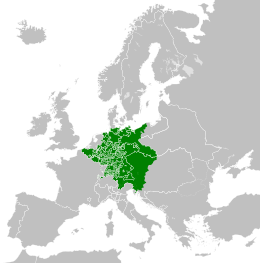Holy Roman Empire (800–1806): Difference between revisions
More languages
More actions
No edit summary Tag: Visual edit |
(30 years war) Tag: Visual edit |
||
| Line 1: | Line 1: | ||
{{Infobox country|name=Holy Roman Empire|native_name=Heiliges Römisches Reich<br>Sacrum Imperium Romanum|image_flag=Flag of the Holy Roman Empire.svg|image_coat=Coat of arms of the Holy Roman Empire.svg|mode_of_production=[[Feudalism]]|government_type=Monarchy|image_map=Holy Roman Empire (1789).svg|map_width=260|map_caption=The empire in 1789|common_languages=German<br>Latin|population_estimate=29,000,000|population_estimate_year=1800}} | {{Infobox country|name=Holy Roman Empire|native_name=Heiliges Römisches Reich<br>Sacrum Imperium Romanum|image_flag=Flag of the Holy Roman Empire.svg|image_coat=Coat of arms of the Holy Roman Empire.svg|mode_of_production=[[Feudalism]]|government_type=Monarchy|image_map=Holy Roman Empire (1789).svg|map_width=260|map_caption=The empire in 1789|common_languages=German<br>Latin|population_estimate=29,000,000|population_estimate_year=1800}} | ||
The '''Holy Roman Empire''' was a political entity in Central Europe during the medieval and early modern periods. It was deeply divided and had internal conflicts between the Emperor and local princes.<ref name=":022222">{{Citation|author=Neil Faulkner|year=2013|title=A Marxist History of the World: From Neanderthals to Neoliberals|chapter=The First Wave of Bourgeois Revolutions|page= | The '''Holy Roman Empire''' was a political entity in Central Europe during the medieval and early modern periods. It was deeply divided and had internal conflicts between the Emperor and local princes.<ref name=":022222">{{Citation|author=Neil Faulkner|year=2013|title=A Marxist History of the World: From Neanderthals to Neoliberals|chapter=The First Wave of Bourgeois Revolutions|page=94–103|pdf=https://cloudflare-ipfs.com/ipfs/bafykbzacedljwr5izotdclz23o3c5p4di4t3ero3ncbfytip55slhiz4otuls?filename=Neil%20Faulkner%20-%20A%20Marxist%20History%20of%20the%20World_%20From%20Neanderthals%20to%20Neoliberals-Pluto%20Press%20%282013%29.pdf|publisher=Pluto Press|isbn=9781849648639|lg=https://libgen.rs/book/index.php?md5=91CA6C708BFE15444FE27899217FBA8E}}</ref> | ||
== History == | == History == | ||
| Line 8: | Line 8: | ||
=== Protestant Reformation === | === Protestant Reformation === | ||
The [[Protestant Reformation]] began in what is now [[Federal Republic of Germany|Germany]] in 1517. The Holy Roman Emperor summoned [[Martin Luther]] to the [[Diet of Worms]] in 1521 and threatened to execute him, but his teachings soon spread across the empire to two-thirds of German villages. Impoverished knights in southern Germany revolted from 1522 to 1523 followed by a [[Peasantry|peasant]] rebellion from 1524 to 1525 that threatened the entire feudal [[mode of production]]. Many German princes who opposed the Pope and Holy Roman Emperor converted to Protestantism.<ref name=":022222" /> | The [[Protestant Reformation]] began in what is now [[Federal Republic of Germany|Germany]] in 1517. The Holy Roman Emperor summoned [[Martin Luther]] to the [[Diet of Worms]] in 1521 and threatened to execute him, but his teachings soon spread across the empire to two-thirds of German villages. Impoverished knights in southern Germany revolted from 1522 to 1523 followed by a [[Peasantry|peasant]] rebellion from 1524 to 1525 that threatened the entire feudal [[mode of production]]. Many German princes who opposed the Pope and Holy Roman Emperor converted to Protestantism.<ref name=":022222" /> | ||
=== Thirty Years' War === | |||
In the early 17th century, Spain launched a feudal [[counterrevolution]] against the Reformation. Anti-Catholic nobles in [[Czech Republic|Bohemia]] threw three imperial officials out of a window in Prague in 1618 and then refused to recognize the new Catholic emperor [[Ferdinand Hapsburg II|Ferdinand]], granting the crown of Bohemia to a German Protestant prince named [[Frederick V of Palatine|Frederick of Palatine]]. Catholic forces defeated Frederick in 1620 and restored the Catholic imperial government. The [[Republic of the Seven United Netherlands|Netherlands]], [[Denmark–Norway (1524–1814)|Denmark]], [[Swedish Empire (1611–1721)|Sweden]], and [[Kingdom of France (987–1792)|France]] intervened against Spain, defeating the Hapsburgs in 1648. The population reduced the German population by half between 1618 and 1648 and drained Spain's resources, allowing France to surpass it in military power.<ref name=":022222" /> | |||
== References == | == References == | ||
[[Category:Medieval history]] | [[Category:Medieval history]] | ||
[[Category:Stubs]] | [[Category:Stubs]] | ||
Revision as of 13:20, 19 January 2023
| Holy Roman Empire Heiliges Römisches Reich Sacrum Imperium Romanum | |
|---|---|
 The empire in 1789 | |
| Common languages | German Latin |
| Dominant mode of production | Feudalism |
| Government | Monarchy |
| Population | |
• 1800 estimate | 29,000,000 |
The Holy Roman Empire was a political entity in Central Europe during the medieval and early modern periods. It was deeply divided and had internal conflicts between the Emperor and local princes.[1]
History
Under the rule of the Hapsburg dynasty, the Holy Roman Empire fought with Spain against France from 1494 and 1559 in northern Italy.[2]
Protestant Reformation
The Protestant Reformation began in what is now Germany in 1517. The Holy Roman Emperor summoned Martin Luther to the Diet of Worms in 1521 and threatened to execute him, but his teachings soon spread across the empire to two-thirds of German villages. Impoverished knights in southern Germany revolted from 1522 to 1523 followed by a peasant rebellion from 1524 to 1525 that threatened the entire feudal mode of production. Many German princes who opposed the Pope and Holy Roman Emperor converted to Protestantism.[1]
Thirty Years' War
In the early 17th century, Spain launched a feudal counterrevolution against the Reformation. Anti-Catholic nobles in Bohemia threw three imperial officials out of a window in Prague in 1618 and then refused to recognize the new Catholic emperor Ferdinand, granting the crown of Bohemia to a German Protestant prince named Frederick of Palatine. Catholic forces defeated Frederick in 1620 and restored the Catholic imperial government. The Netherlands, Denmark, Sweden, and France intervened against Spain, defeating the Hapsburgs in 1648. The population reduced the German population by half between 1618 and 1648 and drained Spain's resources, allowing France to surpass it in military power.[1]
References
- ↑ 1.0 1.1 1.2 Neil Faulkner (2013). A Marxist History of the World: From Neanderthals to Neoliberals: 'The First Wave of Bourgeois Revolutions' (pp. 94–103). [PDF] Pluto Press. ISBN 9781849648639 [LG]
- ↑ Neil Faulkner (2013). A Marxist History of the World: From Neanderthals to Neoliberals: 'European Feudalism' (p. 88). [PDF] Pluto Press. ISBN 9781849648639 [LG]


